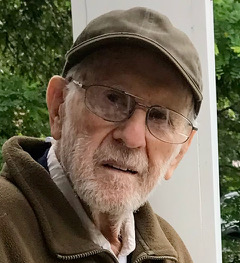Honorable Mention, Sheila Margaret Motton Book Prize, selected by the NEPC Board
Love Lines in Old Age
(for Bert Stern)
If you were a woman I would steal you from your husband,
or if we were gay I would have an affair with you,
but we’re two old Jews, straight, in a manner of speaking,
who dutifully got their Ph.D.s, taught, had kids,
and kept their passion for poetry—reading it, writing it.
I love Whitman a bit more than you do.
You love Blake a bit more than I do,
but we both stick by Yeats; and Wordsworth and Hardy.
You’re drawn to the Buddha; I’m still entwined in the Jewish Bible.
You smile at the way the grass bends when an army invades and the way
it bends when that army retreats, as you read in Du Fu,
while I am stuck on the hot coal the angel’s hand lays on Isaiah’s lips.
We hold our love in our differences and in our contradictions.
To think, I have lived long enough to fall in love with a guy in old age.
So, this is Calamus, without “the love-flesh swelling.”
You keep me going. I keep you going. Poetry keeps us going.
We gas each other up, pump up each other, feed off of each other.
It’s like Whitman rocking in his chair on Mickle St. in Camden,
and his long looked-for camerado finally shows up and they go at
their gabbing, just as we do:
the achievement of Pound—that son of a bitch; the Red Sox;
the beauty of Tennyson when he’s lost his faith; fascism in America;
David Ferry’s gorgeous translations; the women’s movement; what is free verse?
How differently we write—you patiently waiting for nature to reveal itself,
I wrestling with a night spirit until I am bent into a new name.
And then sometimes you write a bit like me and I a bit like you.
How we both adore the necks of Degas’ women, and how we still ache
over the fall of Delmore Schwartz.
And we tell each other our dreams, like exchanging poems—
mine of a carboy seated in the corner of an empty room, crated so
as to safeguard its corrosives,
yours of sitting on a porch in your beloved Adirondacks,
watching squirrels’ tails divest and a plumed scamper turn into a
naked scuttle.
Despite lagging energies, the blanks, the slippages,
how long I have waited for you.
I feel like a kid skipping home from kindergarten
and breathlessly telling his mother,
“I, I made a new friend today.
We’re gonna’ be friends for life.
He, he invited me over.
I, I invited him over.
His name is Bert.”
To a Woman Remembered
I will die, just as you will—you and I
unknown to ourselves and to each other,
when ears can’t hear or tongue make sounds.
Even a young poet who longs to lay a girl
as I did you will in time lack everything.
All shapes will disappear from my mind,
even the ghost of you lingering there,
your voice coming down the stairwell,
“Is that you, Richard?” “It’s me.”
Memories, versions, voices come to an end,
the stairs, rooms, buildings all gone too,
you on the third floor buzzing me in.
Out at the Cape
Sitting on the steps leading down to the lawn
where the plastic clothespins spring-clipped
nothing except themselves to the vacant line,
I suddenly saw those wooden clothespins—
smooth-grained, fork-leggèd and derby-headed—
that my mother used to wedge into the clothesline,
a braided rope also good for making knots or
playing jump rope or grabbing in tug of war, the line
she strung out near the pulley mounted above the gray
clothespin bag, wide and deep as a sower’s sack.
Then those wooden, cleft figurettes disappeared
and I returned to staring, beyond the volley ball net,
at the foliage that marked the end of our property—
leaves and brake and bush and stems and viny things
so dense I couldn’t see through it all, nothing but
that wilding wall of green with gaps of darkness.
I was looking for the answer to my question, “What
should I do now? Was I through now? Was I out of poems?
Have I lost my powers, time now to lie down and die?”
And all I did was sit, staring at the silent green.
Richard Fein

Richard Fein has published 12 books of poetry and three books of translations of Yiddish poetry. He has also published a critical study, Robert Lowell; a memoir of Yiddish, The Dance of Leah; and a book of personal essays, Yiddish Genesis. He lives in Cambridge, MA.
